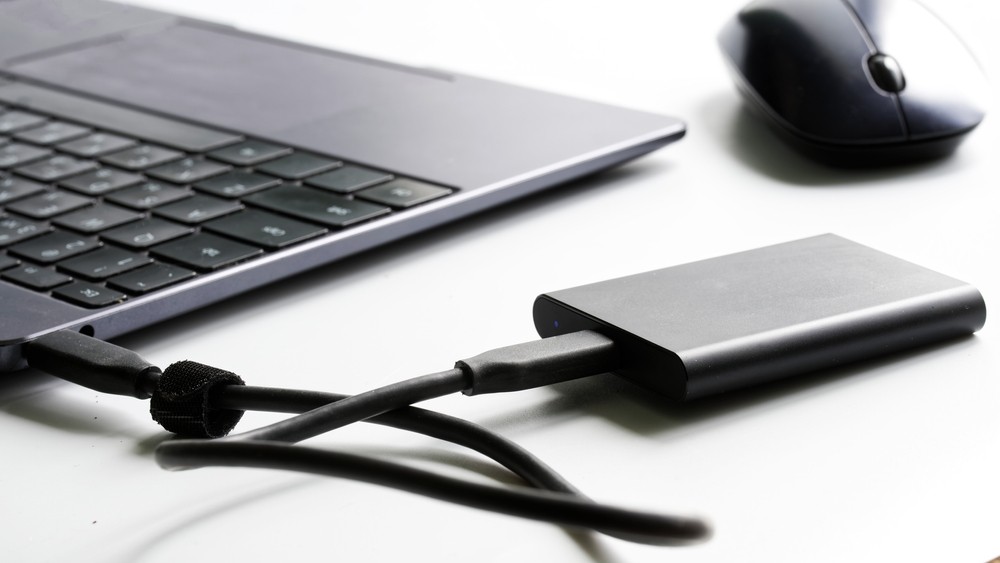Portable Solid State Drives (SSDs) have become an important piece of technology for those seeking efficiency, speed, and reliability, without wanting to bear the sometimes hefty costs associated monthly cloud subscriptions. They’ve become so popular that a lot of no-name knockoff brands have entered the market and sell their SSDs at rock bottom prices. But if your data is important to you, it’s best to avoid those types of companies. But that doesn’t mean you have to go with the most expensive brands either.
The Rise of Portable SSDs
The shift from traditional Hard Disk Drives (HDDs) to Solid State Drives (SSDs) has been a major development in data storage technology. Unlike HDDs, which use mechanical spinning disks to read and write data, SSDs use flash memory to store data, offering faster and more reliable performance. The portability aspect of SSDs has added another dimension of convenience, enabling users to carry large amounts of data with them wherever they go.
The advantages of portability, durability, and speed have made SSDs highly favorable among tech-savvy consumers. These advantages are now accessible without the burden of high costs due to the availability of highly competitive and affordable portable SSD options.
Key Features to Consider
When selecting a portable SSD, price isn’t the only factor to take into account. To ensure you are getting the best possible product suited to your needs, consider these important features:
- Storage Capacity: Typically, portable SSDs range from 250GB to 2TB. Your choice should depend on your storage needs. While 250GB or 500GB might be suitable for regular tasks and file storage, photographers and videographers might require 1TB or more.
- Transfer Speed: Look out for read and write speeds. A good SSD should offer at least 500 MB/s speed, though some newer models can reach up to 2000 MB/s.
- Durability and Build Quality: Being portable, the SSD should withstand daily handling. Features like shock-proof and water-resistance can add to longevity.
- Interface and Compatibility: Most SSDs use USB 3.0 or USB-C interfaces. Ensure compatibility with your devices. USB-C has become the standard for newer devices due to its faster data transfer capabilities.
- Encryption: If security is a concern, SSDs that offer hardware-based encryption are preferable.
Affordable Choices That Don’t Skimp On Performance
Non-name brand portable SSDs have steadily gained traction and credibility by demonstrating that they can deliver performance as good as, if not better than, their more famous counterparts. Here are a few brands worth considering:
Sabrent Rocket Nano
The Sabrent Rocket Nano is a tiny but mighty portable SSD that has quickly captured the interest of users. It boasts a sleek aluminum design and fits easily into a pocket. Despite its small form factor, it offers impressive transfer speeds of up to 1000 MB/s over a USB 3.2 interface. Particularly appealing for its price point, Sabrent ensures that users experience a swift performance without hefty costs, making it ideal for swift file transfers and comprehensive data management.
Silicon Power Bolt B75 Pro
Silicon Power’s Bolt B75 Pro is another excellent portable SSD that challenges bigger brands on both performance and price. With its aviation-grade aluminum housing designed for shockproof protection, this SSD ensures both robustness and reliability. The Bolt B75 Pro offers read and write speeds up to 520 MB/s, accommodating quick file transfers and editing processes, making it valuable for creative professionals and students alike. It also supports a wide array of devices out of the box, underscoring its wide usability.
Crucial X6 Portable SSD
Crucial might be known for its more budget-friendly hardware, but the X6 Portable SSD punches above its weight with a solid performance for its price bracket. Available with capacities up to 2TB, it delivers speeds up to 540 MB/s. Despite not being labeled as a ‘premium’ brand, the Crucial X6 provides a stable and working solution for those looking to store and manage large files effectively.
SanDisk Extreme Portable SSD Clone
While SanDisk itself is a well-known entity, emerging brands have spawned numerous knockoffs or clone models that resemble SanDisk design and performance specs. These clones often repurpose the internal components, providing slightly lesser-known equivalents at a fraction of the cost. They can easily attain speeds of 500 MB/s to 1,050 MB/s and come with similar protective designs, such as IP55 water and dust resistance.
Are Non-Name Brands Reliable?
A common skepticism towards non-name brands is their reliability and build quality. While some concerns are valid, the market is also filled with non-name brand models that prove consistent and durable. Many emerging manufacturers focus on using similar or even the same technologies as established brands, offering consumers nearly equivalent products at better prices.
To ensure reliability, it’s recommended to:
- Check online reviews from verified buyers who have used the product for some time.
- Inspect warranty information. Many reputable non-name brands still offer competitive warranty periods, ensuring safeguards against defects.
- Research the brand’s presence. Some non-name brands are sub-divisions of large tech manufacturers or are partners with OEMs renowned for producing quality components.
Buying Tips for the Informed Consumer
When it comes to acquiring a portable SSD, informed purchasing is key. Aside from the elements such as speed, storage, and build quality, pricing is a decisive factor in settling for a specific brand.
– Price Comparison: Before buying, compare prices across various platforms and stores. Deals fluctuate, and various e-commerce platforms regularly offer discounts on tech gadgets.
– Look for Bundles and Accessories: Manufacturers often provide additional perks such as carrying cases or backup software with the purchase. Such extras can add overall value.
– Check Compatibility with Existing Devices: Often overlooked, verify that the SSD interfaces smoothly with your device’s hardware. USB-C adaptability is a significant advantage for newer devices.
– Avoid Buying Used if Possible: While understandably cheaper, used devices may have unseen wear and tear, unnecessary risk thus exists surrounding lifespan and reliability.
Investing in a portable SSD, especially one that is from a non-name brand without sacrificing quality, depends on carefully matching your needs with the product specifications. By paying attention to storage capabilities, speed, and additional features such as durability and encryption, consumers can find robust and affordable solutions. Whether it’s for personal use, education, or professional creativity, non-name brand portable SSDs provide functionality that meets or, in some cases, exceeds expectations, bridging the gap between fast, efficient data storage and cost-effectiveness.



